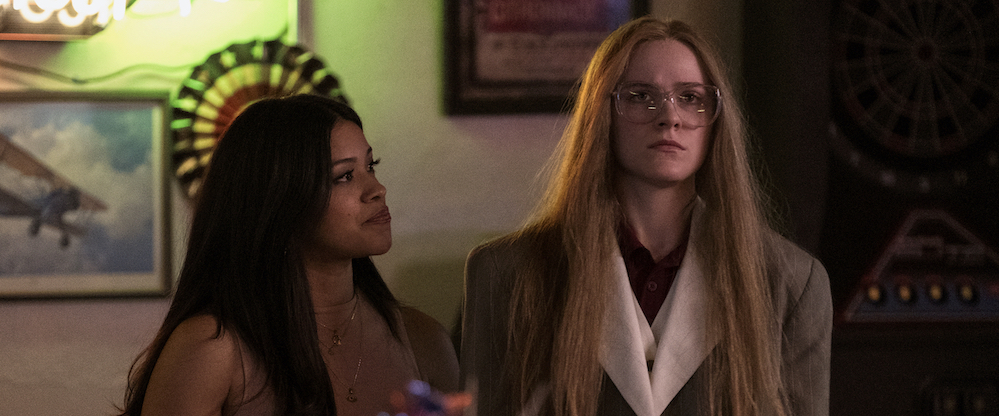Early on into Miranda July’s Kajillionaire, we watch as the misfit family of the world’s dumbest con artists manage to spend what clearly was days plotting a mail heist — right down to knowing the timing of the security cameras and workers’ lunch habits — in order to steal a grand total of a single toy with a $12 gift receipt and a silk tie. Evan Rachel Wood, the youngest of the trio, somersaults and belly-crawls her way past the minimal security as if she were in a Mission: Impossible film, all while her character’s parents, Richard Jenkins and Debra Winger, “keep watch” at a nearby bus stop, clearly with delusions of grandeur that anyone cares about their operation. It’s a perfect encapsulation of what makes Kajillionaire work, despite its in-your-face, Capital-Q Quirkiness. July treats the characters with the utmost sincerity despite the actions of the characters being absurd beyond recognition.
There’s a reason that fluorescent pink foam oozing from a wall is a recurring visual motif in the film — July is going for something that is overflowing with wacky sensibilities. Wood’s Old Dolio dresses like she’s cosplaying as Kevin Smith, wearing the baggiest hockey-jersey-looking sweaters. Jenkins and Winger play Old Dolio’s parents as a pair of conspiracy-addled crackpot scammers that are threatened by the very idea of owning a bank account. Their schemes, the haul of which is split between the family three ways and all expenses (which outweigh their income) are equally shared, are as low-minded as their life’s ambitions. Jenkins at one point tells Old Dolio to not become another one of the many people that just “want to be Kajillionaires,” while dismissing her plan to pay off their back-owed rent via insurance fraud. Pulling the lost luggage job anyway, the three meet Melanie (Gina Rodriguez), who is enamored by the family and, despite being a seemingly normal, functioning member of modern society, wants to join in their game, causing a rift between Old Dolio and her parents.
The film belongs to Wood and Rodriguez, who pull off the slow-building affection between their characters. Rodriguez provides the natural, down-to-earth charm that blends with Wood’s deep-voiced, affect-abundant performance. They form a chemistry that is offbeat, yet appealing. Wood manages to find a real heart beneath her character’s more exaggerated mannerisms, constantly yearning for earnest human connection despite Old Dolio’s lack of emotional intelligence — her parents didn’t want to give her “tender feelings” as a way to protect her. Her performance is matched by Rodriguez’s display of befuddled warmth, equal parts confused by, attracted to and sympathetic for Old Dolio’s damaged psyche.
Jenkins is reliably great at walking the tonal tightrope of his character’s eccentricity and his morally repugnant behavior, proving once again to be one of our most underappreciated actors. Winger similarly pulls this act off, which is arguably more impressive given her character gets the more vicious, cutting lines of dialogue. July’s writing and direction are sharp as a tack in this regard. She achieves that balance of absurdity with an undercurrent of darkness without ever abandoning the warmheartedness she clearly has towards her weird, screwed-up characters.
Kajillionaire is extremely well calibrated, and it needed to be. If July didn’t find that exact right concoction, this film would have been an embarrassing disaster of idiosyncrasy overload — a turd in a frying pan, if you will.1 She, and her cast, hit that sweet spot, and Kajillionaire instead is a heartwarming and sweet film about the kind of people that live in an abandoned warehouse office and know exactly which aisles in the supermarket are easiest to steal from.







